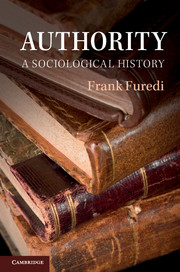Book contents
- Frontmatter
- Contents
- Preface
- Introduction: always in question
- 1 Thersites and the personification of anti-authority
- 2 Socrates and the quest for authority
- 3 Rome and the founding of authority
- 4 Augustus: a role model for authority through the ages
- 5 Medieval authority and the Investiture Contest
- 6 Medieval claim-making and the sociology of tradition
- 7 Reformation and the emergence of the problem of order
- 8 Hobbes and the problem of order
- 9 The rationalisation of authority
- 10 The limits of the authority of the rational
- 11 Taming public opinion and the quest for authority
- 12 Nineteenth-century authority on the defensive
- 13 Authority transformed into sociology's cause
- 14 The rise of negative theories of authority
- 15 By passing authority through the rationalisation of persuasion
- 16 In the shadow of authoritarianism
- Conclusion: final thoughts
- Bibliography
- Index
5 - Medieval authority and the Investiture Contest
Published online by Cambridge University Press: 05 June 2014
- Frontmatter
- Contents
- Preface
- Introduction: always in question
- 1 Thersites and the personification of anti-authority
- 2 Socrates and the quest for authority
- 3 Rome and the founding of authority
- 4 Augustus: a role model for authority through the ages
- 5 Medieval authority and the Investiture Contest
- 6 Medieval claim-making and the sociology of tradition
- 7 Reformation and the emergence of the problem of order
- 8 Hobbes and the problem of order
- 9 The rationalisation of authority
- 10 The limits of the authority of the rational
- 11 Taming public opinion and the quest for authority
- 12 Nineteenth-century authority on the defensive
- 13 Authority transformed into sociology's cause
- 14 The rise of negative theories of authority
- 15 By passing authority through the rationalisation of persuasion
- 16 In the shadow of authoritarianism
- Conclusion: final thoughts
- Bibliography
- Index
Summary
The disintegration of Roman civilisation in the fifth century had a devastating impact on European societies. Warfare and instability were endemic between 500 and 1000 AD, and economic, urban and intellectual life declined and stagnated. Constant military incursions by Germanic tribes unleashed a process of political and institutional disintegration. The unified system of administration institutionalised during the Roman Empire gave way to fragmentation and a highly unstable form of rule. In the absence of a recognised ethos of authority, no stable institutions of governance emerged to provide a focus for cultural unity. Latin Christianity was the only institution that could contain or at least minimise the tendency towards political fragmentation. The Church itself lacked unity and it took centuries for the establishment of an effective papal monarchy which could serve as a focus for spiritual unity. The Pope served as figurehead of a medieval Europe that shared a common religion.
One of the principal questions confronting Europe in the Early Middle Ages, traditionally described as the Dark Ages, was how to establish and give meaning to authority. As Oakeshott states, the ‘problem of government was how to impose and maintain the rudiments of law and order in a world in which the Pax Romana had been destroyed…[and] in which a single, recognized “law of territory” had not yet emerged’. The Church of Rome sought to claim authority on the grounds that it was responsible for the spiritual guidance of Christendom. Although the Church was militarily weak, the ‘Popes were enormously influential as custodians of ideational bonds that continued to hold medieval society (populous christianus) together’. Despite the absence of order, medieval Christian culture could draw upon the legacy of the past, and possessed an idealised version of how authority worked in previous times.
- Type
- Chapter
- Information
- AuthorityA Sociological History, pp. 95 - 123Publisher: Cambridge University PressPrint publication year: 2013



